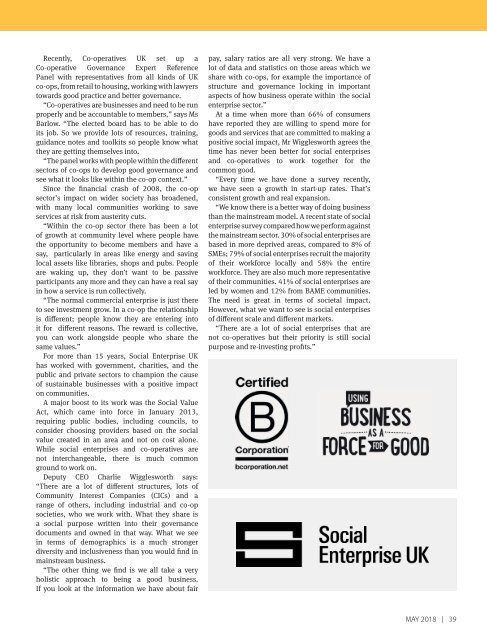MAY 2018
The May 2018 edition of Co-op News: connecting, challenging and championing the global co-operative movement. This issue shines a spotlight on governance – and how co-operatives do it differently. We also look at co-ops on the agenda in Westminster, sustainability supporting and preview some of the motions being put to the vote at the Co-op Group AGM.
The May 2018 edition of Co-op News: connecting, challenging and championing the global co-operative movement. This issue shines a spotlight on governance – and how co-operatives do it differently. We also look at co-ops on the agenda in Westminster, sustainability supporting and preview some of the motions being put to the vote at the Co-op Group AGM.
You also want an ePaper? Increase the reach of your titles
YUMPU automatically turns print PDFs into web optimized ePapers that Google loves.
Recently, Co-operatives UK set up a<br />
Co-operative Governance Expert Reference<br />
Panel with representatives from all kinds of UK<br />
co-ops, from retail to housing, working with lawyers<br />
towards good practice and better governance.<br />
“Co-operatives are businesses and need to be run<br />
properly and be accountable to members,” says Ms<br />
Barlow. “The elected board has to be able to do<br />
its job. So we provide lots of resources, training,<br />
guidance notes and toolkits so people know what<br />
they are getting themselves into.<br />
“The panel works with people within the different<br />
sectors of co-ops to develop good governance and<br />
see what it looks like within the co-op context.”<br />
Since the financial crash of 2008, the co-op<br />
sector’s impact on wider society has broadened,<br />
with many local communities working to save<br />
services at risk from austerity cuts.<br />
“Within the co-op sector there has been a lot<br />
of growth at community level where people have<br />
the opportunity to become members and have a<br />
say, particularly in areas like energy and saving<br />
local assets like libraries, shops and pubs. People<br />
are waking up, they don’t want to be passive<br />
participants any more and they can have a real say<br />
in how a service is run collectively.<br />
“The normal commercial enterprise is just there<br />
to see investment grow. In a co-op the relationship<br />
is different; people know they are entering into<br />
it for different reasons. The reward is collective,<br />
you can work alongside people who share the<br />
same values.”<br />
For more than 15 years, Social Enterprise UK<br />
has worked with government, charities, and the<br />
public and private sectors to champion the cause<br />
of sustainable businesses with a positive impact<br />
on communities.<br />
A major boost to its work was the Social Value<br />
Act, which came into force in January 2013,<br />
requiring public bodies, including councils, to<br />
consider choosing providers based on the social<br />
value created in an area and not on cost alone.<br />
While social enterprises and co-operatives are<br />
not interchangeable, there is much common<br />
ground to work on.<br />
Deputy CEO Charlie Wigglesworth says:<br />
“There are a lot of different structures, lots of<br />
Community Interest Companies (CICs) and a<br />
range of others, including industrial and co-op<br />
societies, who we work with. What they share is<br />
a social purpose written into their governance<br />
documents and owned in that way. What we see<br />
in terms of demographics is a much stronger<br />
diversity and inclusiveness than you would find in<br />
mainstream business.<br />
“The other thing we find is we all take a very<br />
holistic approach to being a good business.<br />
If you look at the information we have about fair<br />
pay, salary ratios are all very strong. We have a<br />
lot of data and statistics on those areas which we<br />
share with co-ops, for example the importance of<br />
structure and governance locking in important<br />
aspects of how business operate within the social<br />
enterprise sector.”<br />
At a time when more than 66% of consumers<br />
have reported they are willing to spend more for<br />
goods and services that are committed to making a<br />
positive social impact, Mr Wigglesworth agrees the<br />
time has never been better for social enterprises<br />
and co-operatives to work together for the<br />
common good.<br />
“Every time we have done a survey recently,<br />
we have seen a growth in start-up rates. That’s<br />
consistent growth and real expansion.<br />
“We know there is a better way of doing business<br />
than the mainstream model. A recent state of social<br />
enterprise survey compared how we perform against<br />
the mainstream sector. 30% of social enterprises are<br />
based in more deprived areas, compared to 8% of<br />
SMEs; 79% of social enterprises recruit the majority<br />
of their workforce locally and 58% the entire<br />
workforce. They are also much more representative<br />
of their communities. 41% of social enterprises are<br />
led by women and 12% from BAME communities.<br />
The need is great in terms of societal impact.<br />
However, what we want to see is social enterprises<br />
of different scale and different markets.<br />
“There are a lot of social enterprises that are<br />
not co-operatives but their priority is still social<br />
purpose and re-investing profits.”<br />
<strong>MAY</strong> <strong>2018</strong> | 39


















